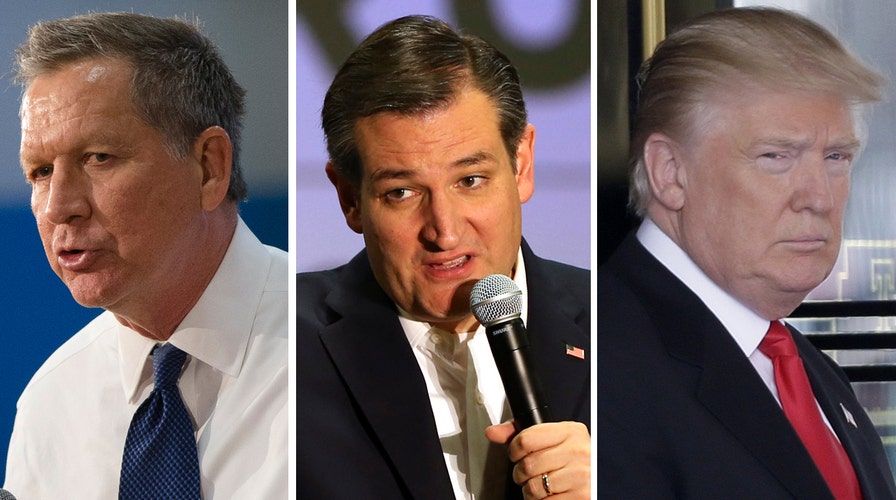All eyes on margin of victory in New York GOP primary
Crunching the delegate math as convention looms
Republican and Democratic presidential front-runners Donald Trump and Hillary Clinton have another chance to edge closer to their respective parties' nominations Tuesday as voters go to the polls in the delegate-rich New York primary.
Pre-primary polls show Trump and Clinton holding comfortable leads, but winning alone is not necessarily enough. Clinton will want a convincing victory to halt rival Bernie Sanders' winning streak and blunt his claims of "momentum" in the Democratic race.
Trump needs to garner more than 50 percent of the statewide vote to have a shot at taking home all 95 of New York’s delegates. Trump has been campaigning heavily in the state with an eye toward that goal, and most recent polls shows him with just over 50 percent support in the state, holding a huge double-digit lead over rivals Ted Cruz and John Kasich.
Trump and Clinton are hoping to win in part on the strength of their local ties. Clinton was twice elected senator from New York, while Trump was born in Queens and lives in a building bearing his name in Manhattan.
"We love this city," Trump said Monday in brief remarks to reporters in the lobby of Trump Tower. "You look at the other folks that are running, they couldn't care less about New York."
Cruz, who infamously panned Trump's "New York values" earlier in the primary, was bracing for a tough showing in the Empire State. The Texas senator was already looking ahead on the primary calendar, scheduling events Tuesday in Pennsylvania, which votes next week.
"New York is Donald’s home state," Cruz told Fox News' Bill O'Reilly Monday evening. "Of course he will do well in his home state. When we were in Texas, my home state, we walloped him."
Trump leads the GOP race with 744 delegates, ahead of Cruz with 545 and Kasich with 144. Securing the GOP nomination requires 1,237 delegates. While it's still possible for Trump to reach that number ahead of the Republican National Convention in Cleveland, it'll be tough. If Trump cannot reach that threshold, voting would proceed to a second ballot at the convention, with a majority of delegates free to vote for whomever they choose.
In the Democratic race, Clinton's campaign was declaring the contest virtually over Monday and warning Sanders that he risks damaging the party's eventual nominee if he keeps up harsh criticism of the former secretary of state.
Clinton campaign manager Robby Mook said Sanders faces a "close to impossible path to the nomination" and predicted New York would result in Clinton taking "an important step to the nomination." Sanders needs to win 68 percent of the remaining delegates if he hopes to clinch the Democratic nomination.
Clinton herself spent the final hours of campaigning in New York trying to drive up turnout among women and minorities, her most ardent supporters. Since Sunday, she's danced to Latin music at a Brooklyn block party, vowed to defend abortion rights to female supporters in Manhattan, prayed at a black church in Westchester, drunk a bubble tea at a dumpling shop in Flushing and cheered newly unionized workers in Queens.
"We're not taking anything for granted," Clinton said Monday after greeting workers at the Hi-Tek Car Wash & Lube in Queens. "Tell your friends and your family, everyone, to please vote tomorrow."
The Sanders campaign has held out hope for a closer race, relying on the large crowds at the Vermont senator's rallies translating into votes Tuesday.
"This is a campaign on the move," Sanders shouted to a crowd of thousands gathered along the waterfront in Queens, the Manhattan skyline serving as a dramatic backdrop. "This is a movement getting the establishment very, very nervous."
Among Democrats, Clinton has accumulated 1,758 delegates to Sanders' 1,076. Those totals include both pledged delegates from primaries and caucuses, as well as superdelegates, the party insiders who can back the candidate of their choice regardless of how their state votes. It takes 2,383 to win the Democratic nomination.
The Associated Press contributed to this report.





